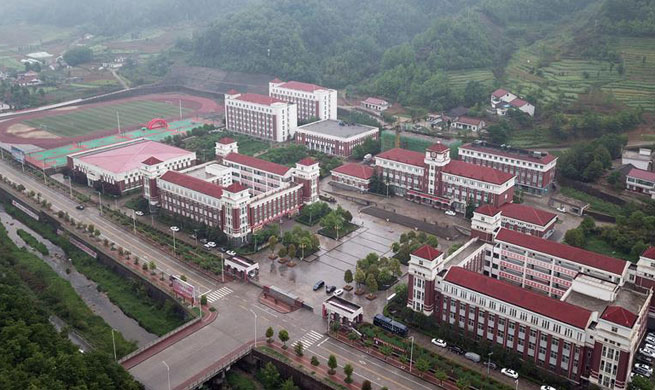by Xia Lin
NEW YORK, May 13 (Xinhua) -- April through May, Yu Xiaolu and Wang Dong have completed their annual tour across America to selective boarding high schools for updated information to help Chinese teenagers apply to study in this country.
"On one hand we prepare our clients for school life abroad before they depart; on the other hand, we meet with those already in the U.S. schools and keep on providing support for them to live through the gauntlet of overseas education," said Yu, while mentioning their first school trip to America took place in 2010.
100 BOARDING SCHOOLS VISITED
Totally on their own expenses, the couple have set foot in over 140 boarding schools in 20 states of America in the past years, including the Hill School and the Westtown School in Pennsylvania, the Episcopal High School and Woodberry Forest School in Virginia, and 35 others for this year. While meeting admission officials and making friends along the way, they saw their former clients now studying here and recommended potential applicants to the schools they visited.
"We do our best as helmsmen for parents who are sending their children to study in America, or those who are planning to do so," Yu told Xinhua.
Back to 2009, the husband-and-wife team started in-depth research about American boarding schools in order to send their own daughter to study here. Hence came the jaunt in 2010 to the United States, a litmus test of their linguistic and cognitive capability which turned out to be a life-changer.
During the quest, the daughter's dream school was found, and, out of blue, the couple became rather determined to forsake their profitable business of telecommunication equipment for a career of admission counselors on overseas study.
Under their guidance over the past six or seven years, around 10 Chinese students have resettled to the United States for high school each year.
SMALL WAS BEAUTIFUL
Ten each year was not a big number for the consulting companies that have mushroomed all over China since 1990s to channel children from affluent families to U.S. schools. However, for Yu and Wang, small was beautiful. With riveted attention and focus, they adhered to the two-on-one counseling pattern all the way through the thick and thin of their clients' studying career, and never coveted to make the number big. "We know that there are many agencies that are solely motivated by money. Many students' futures have been compromised by their streamlined and commercialized service. We want to help them avoid the rabbit holes," said Wang.
In 2015, the couple inaugurated the EduLinkUs L.L.C. in Beijing to serve students within more professional framework and a targeted mindset, insisting on training around 10 teenagers a year with all their nuts and bolts under consideration.
In the 1980s and 1990s, Chinese students typically pursued master's degrees and doctorates. Into the 2000s, for more and more teenagers, the journey to boarding schools in the United States turned into to a natural choice. Yu and Wang woke up early enough to cash in on the tide.
In stark contrast with their counterparts in the industry, they veered into the game with more patience and tenuousness. Profit was not their point, but the comfort and sense of achievement to see a young one to embark on the academic trek one dreamed to fulfill and help him or her integrate into the ever changing scenario of globalized education.
"The number of young students going abroad for study has bloated drastically in the past decade, in steps with China's growing economic power and its people's aspirations to personally feel the vibe of the other parts of the world and develop themselves in same tempo with it. You know, back in 2005, there were only 65 Chinese students going to boarding schools in the United States, more or less the same number we ourselves have successfully processed so far," said Yu, flipping through the admission record of her clientele to Xinhua reporters.
MORE COMPETENT
Admission rates for Chinese students at top elite boarding schools in America go as low as around 1.5 percent. Chancellors and principals calculate to have some foreign attendees to enhance their schools' diversity while capping such enrollments with a five to 10 percent ceiling to defend their originality. This present and clear limit propels Chinese applicants to be high-caliber and multitasking.
"Our clients are not only top in terms of academics, but achieve high in athletics and arts. They love to read and are good at communicating and expressing themselves, with passion and dream. This means that the current generation excels comprehensively with better mien in comparison with those five or 10 years ago. In most cases, they meet the U.S. demands and even exceed them, to the surprise and marvel of the admission officials we talk with," Wang told Xinhua.
Each year during February and March when offers poured in, the couple shared the ecstasy of the families they worked with, which once again attested to the success of EduLinkUs's two-on-one and holistic service pattern.
After each celebration, as always, a new trip to the United States is planned by the pair of munchkins. There are over 280 boarding high schools in this country, which means that their research job is yet to be done.
BENEFITS ON BOTH SIDES
The number of Chinese students studying in American high schools has skyrocketed by 48 percent since 2013, said a report issued by the Institute of International Education of the United States in 2017.
Chinese attendees are strongly welcomed at U.S. schools, for China's highly uniformed teaching style and efficient education system make its children accomplished especially in math and sciences, which are lacking in America.
"Why do American schools welcome students from China? Except for amicable character and deep-rooted virtues, an important factor is that most of them have impressive backgrounds in math and sciences, which complement the American education in a perfect and even seamless way," said Wang.
Vice versa, the surging of teenagers studying in the U.S. high schools has back-fed China's education institutions, with typically American programs like experiential learning, community service and utilization of a diverse range of educational resources increasingly incorporated into their curriculum.
"Meanwhile, parents have started to stream more attention and finance to home education. All of these further contribute to the empowerment of Chinese teenagers in an overall sense for them to compete internationally in their foreseeable future and career," Wang said upon his years of counseling experience.
"This must be a long-term boon for both countries," his wife echoed with a zinger.
(Wang Yuxi at the Pomona College contributed to the story)

















